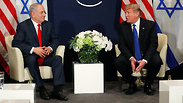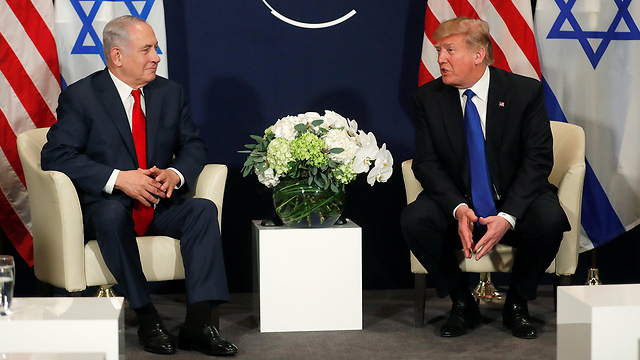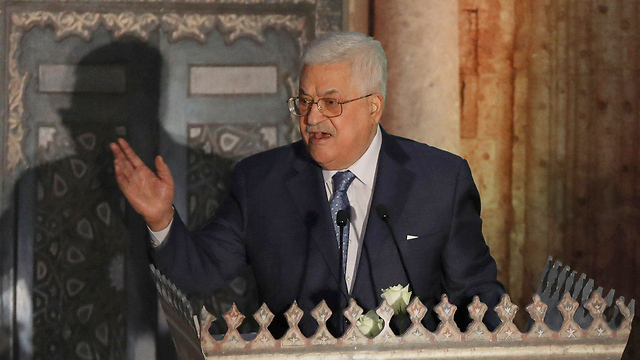
Netanyahu the likely winner in peace talks
Op-ed: Trump believes he has Netanyahu pacified with his pro-Israel stance and is waiting to solicit concession when the time comes, but knowing Abbas far better than the US president, Netanyahu believes peace talks have broken down before they have started. When Trump, enraged over Abbas's insults, accepts that, the two-state formula may be renounced publically.
Despite the strong relations Israel is currently enjoying with the US and the widespread belief that a perfect convergence of views has taken shape between Netanyahu and Trump, particularly as they pertain to the Middle East, Trump has taken a series of measures designed to have Israel sing his praises today, and keep silent tomorrow, if the peace negotiations ever do revive.
If public declarations are anything to go by, Netanyahu has likely laid out before Trump a peace proposal that he believes Israel could live with and also be deemed acceptable to the latter––a plan that likely falls short of the establishment of a Palestinian state, regardless of the precise boundaries.
Whether Netanyahu could ever sell the idea to the Israeli public and its politicians is another matter, but in truth, he has no intention of ever having to get to that point, because the tactics he is employing are designed to overturn the board before the political game has concluded. Trump and Netanyahu are playing it from different corners of the same side of the board, but the conclusion is likely to see a victorious Netanyahu, a vexed Trump and a vanquished Mahmoud Abbas.
When Trump first entered the White House, it could have gone either way for Israel. His capricious nature made it impossible to predict whether or not the the new president’s embrace observers were expecting Netanyahu to receive would eventually tighten into a bear hug by a president who could ostensibly have become rapidly frustrated with the Israeli premier’s political maneuvers.
Impressive to some though Netanyahu’s political prowess may be, it could have been interpreted as stonewalling by the non-nonsense president and an attempt to treat him like a fool.
But for now at least, it is in Trump’s best interest to ingratiate himself with Netanyahu so that when the time to seek Israeli compromise does finally come, even if it falls slightly outside the parameters Netanyahu has already privately set, the Israeli premier will hardly be able to refuse the president.
Trump has succeeded in getting Netanyahu to praise him for a recognition of Jerusalem which, to all intents and purposes, changes very little. Purely symbolic and certainly a step in the right direction, the declaration deliberately made no mention of eastern Jerusalem, and it was made abundantly clear through repeated statements by administration officials that final status issues and exact borders of Jerusalem have certainly not been determined. Despite Trump’s comments in Davos that he had “taken Jerusalem off the table,” he knows perfectly well that Jerusalem remains firmly on the table.
When asked in Davos whether east Jerusalem can be a capital of a Palestinian state, Trump simply ignored the question. Answering another reporter, he said “Israel will pay for that (Jerusalem). Look, Israel, something’s going to happen. They’ll do something that’s going to be a very good thing. But they want to make peace and I hope the Palestinians want to make peace.”
With Netanyahu seemingly lured into a cradle of security from Trump’s perspective by his pro-Israel statements, his nominal declaration that essentially changes only one fact on the ground, namely the relocation of the US Embassy to western Jerusalem, and Israel’s unquestionable loyalty, Trump has Israel––previously on the defense with Obama––pacified. Now, he’s gearing up to solicit concessions from Israel.
To do that, he must now shift his focus to Ramallah, and desperately try and force Abbas to the negotiation table without publicly assuring him of his belief that he can lean on Netanyahu. Even if such assurances were given privately, it will not suffice to alter Abbas’s position
This is because the Palestinian leader, like his predecessors, never misses an opportunity to miss an opportunity, to quote Abba Eban. Like all Palestinian leaders, he marches to the beat of the Arab street. Returning to the negotiation table at this point would be imprudent since it would be interpreted, albeit incorrectly, as capitulation to Israel and the US and a sure step towards political suicide.
Trump, therefore, in his bid to strike the “ultimate deal” and force Abbas to sit down and talk, is adopting strategies designed to back him into a corner. During his electoral campaign, Trump repeatedly criticized Obama’s delegation for not threatening to walk away from the table during the Iran nuclear deal negotiations. It was simply a phrase that he repeated as he took aim at the agreement, but it is clearly a guiding principle that now similarly constitutes a cornerstone of his strategy to ameliorate Abbas’s intransigence.
With each overture to Abbas, Trump “ups the ante” and threatens with measures that will eventually culminate in his departure from the entire peace process, which will no doubt be squarely followed by Israel.
First, reports surface that he may withhold millions of dollars from organizations providing aid to Palestinians. Then he announces that money will be withheld, and then he underscores his point at Davos.
“That money’s on the table and not going to them unless they sit down and negotiate peace because I can tell you, Israel does want to make peace and they’re going to have to want to make peace, or we’re going to have nothing to do with it any longer,” Trump said.
Here is where Netanyahu’s political mastery comes to the fore and where it becomes clear that in this game, it is he who comprehensively grasps “the art of the deal.”
He understands both Trump’s personality and he has had—for years now—Abbas and the Palestinian political climate “sussed.”
Netanyahu is not a rookie and he is perfectly aware why Trump never mentioned east Jerusalem in his December declaration. He knows that in Trump’s eyes, it is still on the table.
But what he also understands, and has been saying for years, is that Mahmoud Abbas, simply does not want a two-state solution, especially not one that would deprive either him of his successor of the ability to finish unsettled business at a later date with the Palestinians’ new sandwiched neighbor, Israel.
For Netanyahu, this is of course a gamble. Abbas could always disappoint him and prove himself to be a dove after all. However, in Netanyahu’s opinion, this isn’t a realistic possibility and when Abbas does completely fall into the trap laid by his own obstinacy, which is easily exploited by Netanyahu’s political dexterity, the Israeli prime minister will have successfully turned Trump’s attention from working to achieve the ultimate deal, to his bitterness over the affront and disrespect shown by Abbas, now the ultimate loser in the game.
For Trump, he has Netanyahu in a quiet corner where he believes he can depend on him when the time is right. He also has Abbas on the ropes where he wants him, and he is counting down before he calls it over.
Abbas is attempting to placate the Arab street and portray himself as the leader capable of resisting “Zionist-American” pressure.
Netanyahu, however, is simply taking a seat in his corner and rejoicing as he watches Trump grow increasingly frustrated and insulted by Abbas.
If Abbas does keep this up––his shunning of Vice President Mike Pence does not augur well for a sudden change of position––the president will walk, the money will go and Netanyahu will have presented a plan for peace to the White House that he banked on never having to sell to the Israeli Right.
This would finally enable Netanyahu to force open the way for a complete revision of the old formula for peace and deliver a coup de grâce against the two-state solution.
Many believe, including the current author, that Netanyahu has never wanted a two-state solution. He wants to banish the term from political discourse and he also wants a US administration to abandon the idea, even though he isn’t quite in a position to say it openly. Not yet, at least.
Nevertheless, he knows that Abbas’s repeated affronts to Trump and refusal to come to the negotiating table may just send him over the edge, nudging the president into making the plunge he—Mr. Netanyahu—has long been waiting for, and dragging with him the concept of the two-state solution to its final demise.
Following that, Israel and the US will further consolidate relations under the current administration and with the failures of tried and tested doctrines, radically revised ones will have to be drawn up, including the former businessman possibly issuing a blank cheque to Israel for construction in the territories.












